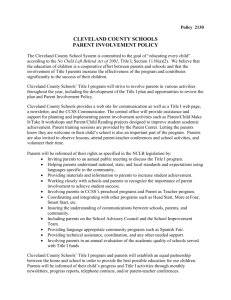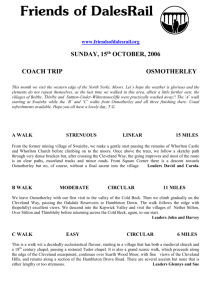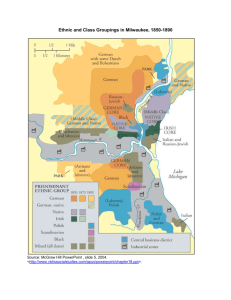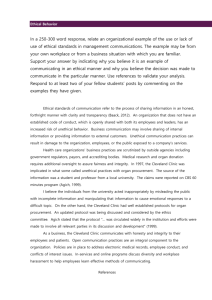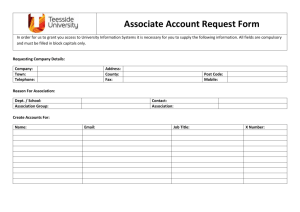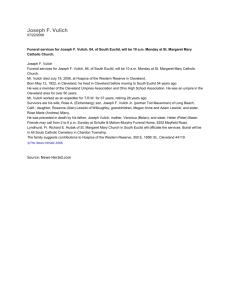2013 HTF Affordable Housing Application
advertisement
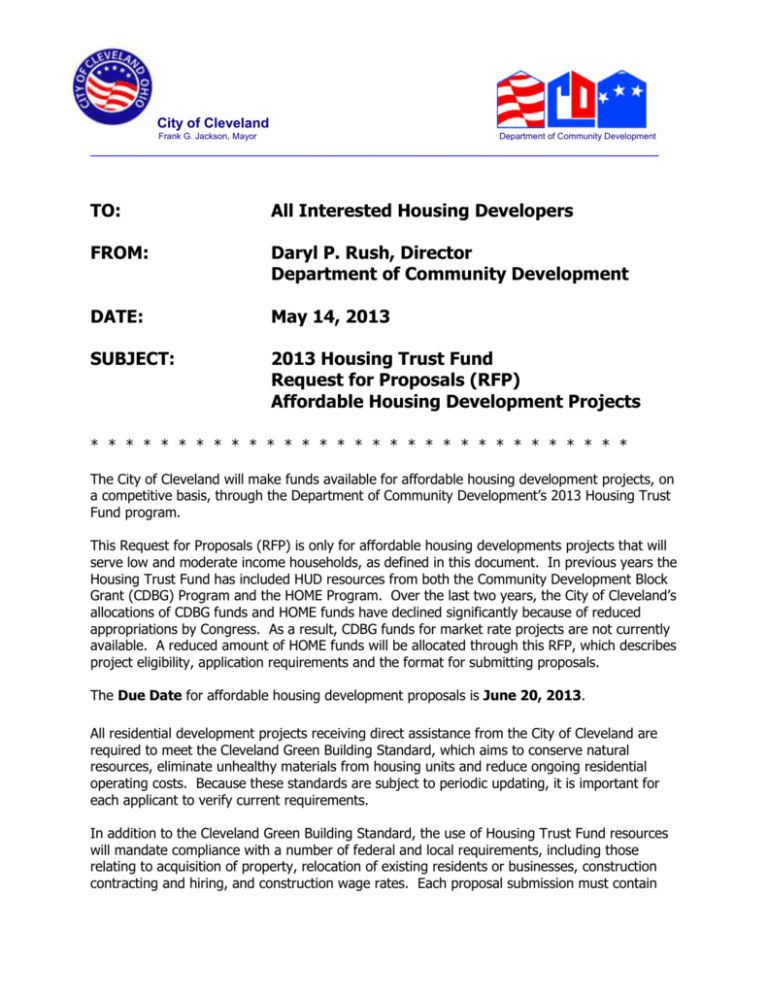
City of Cleveland Frank G. Jackson, Mayor Department of Community Development __________________________________________________________________________ TO: All Interested Housing Developers FROM: Daryl P. Rush, Director Department of Community Development DATE: May 14, 2013 SUBJECT: 2013 Housing Trust Fund Request for Proposals (RFP) Affordable Housing Development Projects * * * * * * * * * * * * * * * * * * * * * * * * * * * * * * * The City of Cleveland will make funds available for affordable housing development projects, on a competitive basis, through the Department of Community Development’s 2013 Housing Trust Fund program. This Request for Proposals (RFP) is only for affordable housing developments projects that will serve low and moderate income households, as defined in this document. In previous years the Housing Trust Fund has included HUD resources from both the Community Development Block Grant (CDBG) Program and the HOME Program. Over the last two years, the City of Cleveland’s allocations of CDBG funds and HOME funds have declined significantly because of reduced appropriations by Congress. As a result, CDBG funds for market rate projects are not currently available. A reduced amount of HOME funds will be allocated through this RFP, which describes project eligibility, application requirements and the format for submitting proposals. The Due Date for affordable housing development proposals is June 20, 2013. All residential development projects receiving direct assistance from the City of Cleveland are required to meet the Cleveland Green Building Standard, which aims to conserve natural resources, eliminate unhealthy materials from housing units and reduce ongoing residential operating costs. Because these standards are subject to periodic updating, it is important for each applicant to verify current requirements. In addition to the Cleveland Green Building Standard, the use of Housing Trust Fund resources will mandate compliance with a number of federal and local requirements, including those relating to acquisition of property, relocation of existing residents or businesses, construction contracting and hiring, and construction wage rates. Each proposal submission must contain signed statements that the applicant acknowledges the various regulations pertaining to the receipt of Housing Trust Fund assistance and that the applicant is not suspended, debarred or otherwise prohibited from receiving federal funds. Developers of rental housing should note that 10% of the units must be fully accessible to persons with mobility impairments. In addition, all newly constructed rental units must meet a visitability standard that is described in the RFP. With the reduced level of available resources, the number of proposals submitted to the Housing Trust Fund is expected to exceed the number of projects we will be able to assist. Therefore, we place great emphasis on identifying those projects that can best help us in achieving our housing and community development objectives. Particular attention will be given to how each proposal may relate to an overall strategic approach to revitalization in its surrounding neighborhood. A project will have a significant advantage in the selection process if it is an integral part of a credible comprehensive neighborhood revitalization strategy. Selection of projects to receive HTF assistance will be based on the information submitted in response to the RFP. Any subsequent material modification of the proposed project, such as changes to the development team, financing, scope or design, which is not approved by the City of Cleveland, may result in the withdrawal of the HTF award. HOUSING TRUST FUND REQUEST FOR PROPOSALS (RFP) AFFORDABLE HOUSING PROJECTS City of Cleveland Department of Community Development 601 Lakeside Avenue, Room #320 Cleveland, Ohio 44114-1070 Due Date: June 20, 2013 1 TABLE OF CONTENTS Submission Procedures and Selection Process Project Eligibility and Selection Factors Selection Criteria Eligible Projects Maximum Request Eligible Participants Eligible Locations Eligible Uses Cleveland Green Building Standard Permanent Supportive Housing Visitability Standard & Handicapped Accessibility Requirement Terms and Conditions of HTF Financing Notice of Required Certifications Attachment A – Low & Moderate Income Limits Attachment B - Proposal Format Section 1: Project Overview Section 2: Development Team Section 3: Strategic Importance Section 4: Project Readiness Section 5: Site Control Section 6: Project Financing Plan Section 7: Cleveland Green Building Standard Compliance Section 8: Request for HTF Assistance Section 9: Other City Assistance Being Requested Section 10: Market Analysis & Marketing Plan Other Required Submission Attachments Compliance Certification Description & Contact Persons Compliance Certification Signature Page Debarment/Suspension Certification Document Submission Checklist 2 Page 3 3 4 4 4 4 5 5 5 6 6 7 8 9 SUBMISSION PROCEDURES AND SELECTION PROCESS All requests for assistance from the Housing Trust Fund must follow the attached Proposal Format. All applicable requested information must be provided. Any additional information that can assist in the evaluation of the proposal may be included. Four copies of each proposal must be submitted. Proposals must be received in the Department of Community Development’s Office by 5:00 p.m. on June 20, 2013. Proposals may be mailed to: Department of Community Development Room #320, City Hall 601 Lakeside Avenue Cleveland, Ohio 44114-1070 A review committee consisting of the Director of Community Development and appropriate staff members will make funding recommendations. Committee recommendations will be subject to approval by City Council. Your first point of contact on project questions and the proposal process should be one of the following staff members: Mike McBride (216-664-2005) Kevin May (216-664-4035) Alethea Ray (216-664-4098) Daniel DeAngelo (216-664-4036) Bill Resseger ( 216-664-2351) PROJECT ELIGIBILITY AND SELECTION FACTORS Selection Criteria: The Housing Trust Fund (HTF) will provide public capital for investment in housing development projects that will increase the supply and affordability of new or rehabilitated units and assist in achieving neighborhood revitalization objectives. Selection of projects will be competitive, based on the following criteria: 1) Feasibility of the project as indicated by site control, project financing structure, financial commitments and marketability. 2) Capacity of the applicant to initiate construction within one year of HTF award. 3) Quality of design and construction of the proposed project. 4) Relationship to a strategic approach to revitalization in the area surrounding the project. Projects which are an integral part of a credible, comprehensive neighborhood revitalization strategy will have an advantage. 3 5) Extent to which sustainability, environmentally sensitive, energy efficiency or “green” principles are reflected in the proposal. 6) Extent to which the project represents an innovative approach to neighborhood revitalization goals. 7) Rate at which resources will be returned to the Trust Fund through payments of principal and interest. Eligible Projects: Projects must be affordable to low and moderate income households that qualify under the Federal HOME Program regulations. For rental projects, 80% of the units must be affordable to households with incomes at 60% or less than areawide median income (AMI) and 20% of the units must be affordable to households with incomes at 50% or less than AMI. For sale units must be for households with incomes at 80% or less of AMI. Income limits are adjusted annually. The applicable income limits for 2013 are in Attachment A. Other eligibility requirements include: New construction or substantial rehabilitation residential projects with construction costs of at least $25,000 per unit. All projects must comply with the Cleveland Green Building Standard (see Page 5). Proposals must be for at least 5 units, with preference given to projects of 15 or more units. Permanent supportive housing facilities designed to assist homeless persons are eligible if endorsed by the Cleveland/Cuyahoga County Continuum of Care (see Page 5). Emergency shelters and transitional housing are not eligible. Proposals for scattered site projects must be part of the implementation of a comprehensive neighborhood revitalization plan. Maximum Request: Proposals may not be for more than $600,000 or 25% of the total development cost of the project, whichever is less. Eligible Participants: Developers may be for-profit or non-profit. Eligible Locations: City-wide 4 Eligible Uses: Funds can be used as short-term or long-term secured financing for project development costs. These may include, but are not limited to: costs of land assemblage demolition and site preparation site improvements construction costs costs of obtaining permits, zoning approvals, etc. consultant, architectural, legal, audit, mortgage and other fees carrying charges and costs of financing Cleveland Green Building Standard: All housing development projects receiving Housing Trust Fund assistance must comply with the requirements of the Cleveland Green Building Standard. This will assure that Housing Trust Fund projects are designed and built using practices that reduce building operating costs, eliminate unhealthy building materials, conserve natural resources and contribute to improved regional land use patterns. A guide to meeting the Cleveland Green Building Standard and the required Certification Form can be accessed at: http://webapp.cleveland-oh.gov/aspnet/docs/get.aspx?id=595&file=ClevelandGreenCertForm.pdf or by going to the City of Cleveland website: http://www.city.cleveland.oh.us , clicking on Department of Community Development and then on Tax Abatement under “Most Requested”. The Cleveland Green Standard information is included as part of the description of Cleveland’s Residential Tax Abatement Program. (Since this information is periodically updated, applicant should check for current program requirements.) Questions about the Cleveland Green Building Standard can be directed to Mike McBride at 216664-2005 or mmcbride@city.cleveland.oh.us. Permanent Supportive Housing If the proposed project will provide housing specifically for formerly homeless individuals or families, the submission must include a letter of endorsement from the Cleveland/Cuyahoga County Continuum of Care, which coordinates the planning and implementation of homeless assistance in the community. The Continuum of Care is managed by the Cleveland/Cuyahoga County Office of Homeless Services. For additional information contact: Ruth Gillett, Manager Office of Homeless Services 310 West Lakeside Avenue, Suite 595 Cleveland OH 44113-1021 216-420-6844 rgillett@cuyahogacounty.us 5 Visitability Standard & Handicapped Accessibility Requirement All newly constructed affordable rental housing units must incorporate the following Universal Design elements, which constitute “visitability”: 1. No step entrance: Provide at least one “no step” entrance into the unit. The required “no step” entrance shall be accessed via an accessible route (driveway, sidewalk, garage floor, etc.) Ramps that extend out into the front or back yards are usually not the appropriate solution. 2. Doors/Openings: All doors and openings shall have a minimum net clear width of 32 inches. 3. Bathroom/Half Bath: Provide a bathroom or half bath on the main floor with clear floor space of 30 inches by 48 inches. Questions about design solutions for achieving the visitability standards can be directed to Daniel DeAngelo at 216-664-4036 or e-mail to: DDeAngelo@city.cleveland.oh.us In addition, it should be noted that for construction of affordable rental buildings, the requirement for units that are fully accessible to persons with mobility impairments has been increased from 5% to 10%. Terms and Conditions of Housing Trust Fund Financing: All Housing Trust Fund allocations will generally be in the form of secured loans, which can be subordinate to other financing sources. Repayment terms will be structured to the needs of each project. 6 PLEASE NOTE Assistance available through the Housing Trust Fund is subject to compliance with all applicable Federal, state and/or local regulations. These requirements could substantially affect the cost of completing your project. It is essential that you fully understand these obligations prior to submitting a Housing Trust Fund application. Each Housing Trust Fund proposal submission must include two certification forms signed by a representative of the developer: 1. Federal, State & Local Compliance Certification This form lists and briefly describes the various laws and regulations that apply to the use of Housing Trust Fund financial assistance. There are also contact persons listed that can answer questions and provide detailed information. The applicant must acknowledge receipt of this information and the obligation to comply with all applicable laws and regulations should the project be selected for Housing Trust Fund assistance. Please note that the provisions of section 188, known as the Fannie Lewis Resident Employment Law, apply to any HTF award of $100,000 or more. 2. Suspended/Debarred Agency or Contractor Certification All applicants for Housing Trust Fund assistance must certify that no members of their development team have been debarred, suspended, declared ineligible or are otherwise prohibited from receiving Federal funds. The certification also covers past convictions and current indictments related to use of public funds. Questions about this certification may be referred to Kellie Glenn, Interim Compliance Manager, at 216-664-4070. Descriptions of the certifications and the certification forms for signature are included at the end of the application. 7 2013 HOUSING TRUST FUND ATTACHMENT A Low and Moderate Income Limits (Updated Annually) Rental Projects – Maximum Household Income Levels Household Size 80% of Units at or below 60% of AMI 20% of Units at or below 50% of AMI 1 26,640 22,220 2 30,480 25,400 3 34,260 28,550 4 38,040 31,700 5 41,100 34,250 6 44,160 36,800 7 47,220 39,350 8 50,220 41,850 For Sale Projects – Maximum Household Income Levels Household Size Homebuyer Income at or below 80% of AMI 1 35,500 2 40,600 3 45,650 4 50,700 5 54,800 6 58,850 7 62,900 8 66,950 8 2013 HOUSING TRUST FUND AFFORDABLE HOUSING PROJECTS ATTACHMENT B PROPOSAL FORMAT Four copies of the attached proposal format and required attachments must be submitted, except as specifically noted. All requested information must be included in the proposal. The proposal is a working guide for developing, evaluating and implementing a real estate development project. Project readiness and feasibility are the primary criteria for HTF support. Therefore project characteristics, critical paths, schedules, persons involved and responsibilities, market information, financing and desired outcomes are essential elements of your Housing Trust Fund submission. 9 CITY OF CLEVELAND 2013 HOUSING TRUST FUND AFFORDABLE HOUSING PROJECT Name of Project: ____________________________________________ Project Address or Location: ____________________________________ Name of Applicant: ____________________________________________ Applicant Address: ____________________________________________ ___________________________________________________ Name of Applicant Contact Person: _______________________________ Contact Person Telephone #: ____________________________________ Contact Person E-mail: _________________________________________ Section 1: PROJECT OVERVIEW Provide a brief narrative description of the proposed project: 1 Product Type Single Family Multi-Family: Townhouses Multi-Family: Other Live/Work Mixed Use: Residential and Commercial # of units Tenure Type # of units For Sale For Rent Construction Type # of units New Construction Rehabilitation Adaptive Reuse (conversion of non-residential space to housing) 2 Section 2: DEVELOPMENT TEAM Developer Partners Name Address Phone No. Other Development Team Members (where applicable) Architect Lawyer Accountant Certified Environmental Professional Engineer Green Building Consultant General Contractor Project Manager Construction Manager Sales & Marketing Management 3 Key Staff Developer Experience and Capacity Use the space below to describe any relevant background and/or experience that demonstrates the capacity of the development team to successfully carry out the project. (Additional information may be attached) 4 Section 3: STRATEGIC IMPORTANCE Project Concept: Use the space below to address the following: How does the proposed project relate to a strategic approach to revitalization of the surrounding neighborhood? Will the project contribute to a change in the market dynamics, economic status, physical appearance or perception of the neighborhood? Will the project leverage or encourage spin-off activity or other investment in the area? Does the project address specific housing affordability needs or contribute to the goal of mixedincome communities? 5 DESIGN: Describe how the project design addresses its neighborhood context and identify any specific design or construction quality elements that should be noted during the proposal review process. Please Attach: Copies of plans, drawings and/or specifications that will clearly indicate the scope of work to be undertaken and the types of materials to be used. New construction projects must provide site plans and drawings of exterior elevations. Substantial rehabilitation projects should include drawings of any significant exterior changes. (For large scale drawings or plans, it will only be necessary to submit one copy). COMMUNITY SUPPORT Use the space below to describe your community support, specifically: Is the project supported by the community residents, stakeholders, institutions, etc? How was the support obtained? Is there a plan with specific strategies for garnering community support for the project? Are the community stakeholders involved in the development process? If so, in what manner? 6 Section 4: PROJECT READINESS PROJECT MILESTONES (insert dates as appropriate) Task Project Feasibility Market Study Community Process Blight Study Environmental Review Remediation Voluntary Action Plan Traffic Study Parking Study Historic Pres. Review Green Building Checklist Site Control Site Acquisition Resident Relocation Plan Design, Review and Approval Arch & Eng. Zoning Fire Safety Assessment Design Review Plan Review and Approval Plat Approval Financing Secure Financing Construction Permit Demo & Site Prep Utilities Infrastructure Construction Certificate of Occupancy Marketing and Sales * N/A =Not Applicable Start Complete 7 N/A* Comments Section 5: SITE CONTROL SITE CONTROL STATUS SUMMARY (add rows as needed) PPN and Address Date Site Control Secured* In Negotiation (Owner Name) To Be Initiated (Owner Name) Current Zoning *Provide evidence of site control: option agreement, deed, lease, etc. In addition, please attach the “URA Proposed Project Information Form” listing all properties to be included in the project. The URA Proposed Project Information Form is available online at: http://www.city.cleveland.oh.us/CityofCleveland/Home/Government/CityAgencies/Co mmunityDevelopment/FormsPublications , or contact our office for URA documents. Applicants are encouraged to seek guidance as early as possible to assist in project compliance with the Uniform Relocation Assistance and Real Property Acquisition Policies Act of 1970, commonly known as the “URA” or the “Uniform Act.” Acquisition of real property for projects receiving assistance through the Housing Trust Fund is regulated by the URA, including vacant land and properties with structures. The URA also affords certain rights and protections to owners and tenants (residential and commercial) of property being acquired. For early assistance, complete and submit a URA Proposed Project Information Form to the URA Unit in the Compliance Section of the Department of Community Development. It may be submitted via e-mail to: Marc Foy, Lead Compliance Officer Address: mfoy@city.cleveland.oh.us Phone: (216) 664-4389 For technical assistance with the URA Proposed Project Information Form, please call Robert Laycock, Compliance Officer, at (216) 664-4094 or write to rlaycock@city.cleveland.oh.us. Note: Even if submitted for advance guidance, a hard-copy printout of the URA Proposed Project Information Form must be attached to the HTF application. 8 Section 6: PROJECT FINANCING PLAN 6a. Unit Costs # of Units Project Cost Cost/Unit Cost/Sq. Ft. 6b. Summary Sources and Uses Sources of Funds Total $ Status* (Applied For or Committed) Developer Equity Tax Credit Equity** 1st Mortgage Loan Other loan: _______ Other loan: _______ Other loan: _______ Other Grant: ______ Other Grant: ______ Other: ___________ Total Sources: Uses of Funds Acquisition Architectural/Engineering Site Preparation Construction Hard Costs Contingency – Hard Cost Soft Costs Contingency – Soft Cost Developer Fee Other: ___________ Total Uses Surplus/(Gap) *Attach documentation showing the current status of all proposed funding commitments. **Projects that are proposing to use equity from 9% Low Income Housing Tax Credit must have, at minimum, a Conditional Reservation for 2013 Credits. 9 6.c Projected Rents or Sales Prices Rental Projects Unit Size # of Units Projected Utilities Sq. Feet Rents Included? (Y/N) Efficiency 1 Bedroom 2 Bedroom 3 Bedroom 4 or more Bedrooms For Sale Projects # of Bedrooms 2 Bedrooms 3 Bedrooms 4 or more Bedrooms # of Homes Sq. Feet Projected Sales Price 6.d Detailed Development Proformas & Rental Housing Operating Proforma Please complete and attach the detailed project development pro forma statements and rental housing operating pro forma (if applicable) that can be accessed through the links below: http://cd.city.cleveland.oh.us/forms/prp.xls for rental projects or http://cd.city.cleveland.oh.us/forms/psp.xls for sales projects. Information presented in equivalent pro forma formats is acceptable Section 7: CLEVELAND GREEN BUILDING STANDARD COMPLIANCE All housing development projects using assistance from the 2013 Housing Trust Fund must comply with the requirements of the Cleveland Green Building Standard. There are two primary rating systems that can be used to demonstrate compliance with the Cleveland Green Building Standard. Please indicate which rating system will be used to evaluate this project. Rating System Check One Enterprise Green Communities Leadership in Energy and Environment (LEED) - Silver Certification or higher The HTF application must include a completed checklist for the selected rating system that shows the specific green building methods to be used in the project. Questions about the Cleveland Green Building Standard can be directed to Mike McBride at 216-664-2005 or mmcbride@city.cleveland.oh.us. 10 Section 8: REQUEST FOR HOUSING TRUST FUND ASSISTANCE Indicate the amount you are requesting from the Housing Trust Fund, the proposed use of the funds and the requested repayment terms. Section 9: OTHER CITY ASSISTANCE BEING REQUESTED Indicate the type and amount of any other City assistance you have requested or intend to request, in addition to that requested from the Housing Trust Fund. Need Amount Ward Funds Infrastructure Other: Other: Other: 11 Loan Terms Committed / Pending Section 10: MARKET ANALYSIS & MARKETING PLAN Target Market Use the space below to describe your market including: What is the profile for the buyers/tenants you anticipate the project attracting? Are any other demographics relevant to the project (i.e., senior population, households, families with children) What is the basis for selecting the market? How does the market for the project compare with the market in the neighborhood and in the area around the project? Does the ownership strategy (condominium, fee simple, homeownership assoc.) affect the market in the area around the project? Are any specific potential buyers/tenants identified? (reservations, letters of intent, etc.) What will be attractive to buyers/tenants about this product or project? What income ranges are the residential rental/purchase prices targeted toward? How do the projected ranges compare with those currently found in the area? Is a competitive product available? If so, where? How does the project compare (size, rental rates or sales prices, amenities, condition, etc.)? What is the project’s competitive advantage? 12 Marketing Plan Use the space below to describe your marketing plan: What are the strategies for marketing the project? Who will perform marketing and what media will be used? What is the schedule for marketing the project? Upon what assumptions are the leasing/sales rates (absorption) based? In the event that leasing/sales take longer then anticipated, what are the expected costs and what will be the contingent strategies? How do the marketing strategies relate to the proforma marketing line items and projected expenses? 13 Other Required Submission Attachments (Only one copy of the following information is required) Most recent financial statement of developer. Evidence of corporate status including, where applicable: Articles of Incorporation, current Certificate of Continued Existence from Ohio Secretary of State, and evidence of tax-exempt status. Partnership certificate and/or agreement, if applicable. Signed original of the Federal, State & Local Compliance Certification. Signed original of the Suspended/Debarred Agency or Contractor Certification. 14 Federal, State & Local Compliance Certification 2013 Housing Trust Fund When public funding is used to assist an eligible activity, detailed and specific record keeping and documentation will be required to support adequate compliance with all applicable regulatory laws/guidelines. These Federal, State and Local regulations can impact an activity’s budget and timeline. The Department of Community Development’s Compliance Section and the Office of Equal Opportunity (OEO) can assist in understanding and achieving full compliance with applicable regulatory requirements. It is therefore important to establish an ongoing working relationship with appropriate City staff to understand the impact that federal regulations will have on activities assisted through the Competitive Development Grant Program. Financing assistance available through the City of Cleveland will be subject to compliance with all applicable Federal, state and/or local regulations. These compliance procedures will be required, with specific supporting documentation, if federal assistance is pursued for a project. This documentation is required (unless otherwise notified in writing by the Department of Community Development) regardless of the date you apply for federal assistance or the source of funds used to begin your project. Failure to comply could substantially affect the ability of the City to participate in project financing for your project. For any general compliance questions, please contact Kellie Glenn, Interim Compliance Manager, at (216) 664-4070 or kglenn@city.cleveland.oh.us. For information on specific Compliance requirements, please contact the individuals listed on the following pages. 15 COMPLIANCE REQUIREMENTS AND CONTACT PERSONS Applicable Law Acquisition/Relocation Uniform Relocation Act (URA) FEDERAL/LOCAL Marc Foy – (216) 664-4389 mfoy@city.cleveland.oh.us Additional information on page 18 Environmental/Historic FEDERAL Note: Historic Preservation is part of the environmental compliance. Kellie Glenn – (216) 664-4070 kglenn@city.cleveland.oh.us Lead Abatement FEDERAL/STATE/ LOCAL Kellie Glenn – (216) 664-4070 kglenn@city.cleveland.oh.us Prevailing Wages Davis-Bacon FEDERAL Debra Frantz – (216) 664-4015 dfrantz@city.cleveland.oh.us Affirmative Marketing FEDERAL Kellie Glenn – (216) 664-4070 kglenn@city.cleveland.oh.us Regulation Triggers Time Frame Consequence of Noncompliance Uniform Relocation Act becomes applicable if any Federal funds or actions are used for projects that involve Acquisition, Demolition, Rehabilitation, or Conversion activities. The use of any federal funds in project financing Planning Stage through postconstruction Loss of dollars allocated to the project. Projects that have any type of Federal dollars involved must be reviewed for the impact or potential effects the project could have on the environment and/or historic properties/districts. The use of any federal funds in project financing Loss of dollars allocated to the project. Requires notification/ disclosure of lead-based hazards to occupants, evaluation and reduction of lead hazards in rehabilitated residential units and, if applicable, ongoing maintenance of residential units. Rehab and demolition activities. Planning Stage Note: If a Request for Release of Funds (RROF) is required from HUD, then a twomonth lead time is necessary prior to the start of construction. Prior to Construction Stage Payment of federal prevailing wage rates to construction-related employees may be required depending on the number of units and the uses of the federal funds. Funding in excess of $2,000 for construction costs CDBG: 8 units or more HOME: 12 units or more Application Stage Contractor debarment Marketing efforts are required to attract and encourage families and individuals to apply for project-related housing (that is, those that would be less likely to apply for residence in the housing units). 5 units or more, any HOME dollars regardless of Davis Bacon applicability Application Stage Penalties 16 Penalties Minority/Female Business Enterprise (MBE/FBE) & Cleveland Area Small Business (CSB) LOCAL Hank Swager Office of Equal Opportunity (216) 664-4153 hswager@city.cleveland.oh.us Section 3 FEDERAL Debra Frantz – (216) 664-4015 dfrantz@city.cleveland.oh.us Fannie M. Lewis Cleveland Resident Employment Law LOCAL Hank Swager Office of Equal Opportunity (216) 664-4155 hswager@city.cleveland.oh.us Americans with Disabilities FEDERAL/LOCAL (Multi-Family New Construction or Multi-Family Rehabilitation Only) Kellie Glenn – (216) 664-4070 kglenn@city.cleveland.oh.us Construction projects are required to use 15% MBE, 7% FBE and 8% CSB to implement the project. All project related contractors and subcontractors must be reported. $10,000 or more of city assistance for construction contracts. Monthly Reports during the Construction Stage Forfeit 20% of principle loan/grant amount; 10% of retained contract funds. Numerical Goals: require that thirty percent (30%) of new hires be low-income (Section 3 Residents). At least ten percent (10%) of total dollar amount of all Section 3 covered contracts to be awarded to certified Section 3 businesses. $200,000 in HUDfunded assistance. Quarterly reports during the Construction Stage. Application of HUD Sanctions. Construction contracts with $100,000 or more of City assistance require residents of the City to perform 20% of the total Construction Worker Hours (“Resident Construction Worker Hours”). Additionally, best efforts must be made to assure that 4% of the Resident Construction Worker Hours are filled by persons with a family income that does not exceed 50% of the HUD area-wide median income. $100,000 or more of City assistance for construction contracts. Monthly Reports during the Construction Stage Forfeiture of 1/8th of 1% of the final total amount of the contract for each full percentage point by which the contractor falls short of the contract agreement. Multi-family structures (5 units or more under one roof) built for occupancy after March 13, 1991 must meet accessibility requirements - ten percent (10%) or at least 1 unit, to accommodate persons with mobility disabilities. Also, two percent (2%), or at least one unit, for hearing or visually-impaired individuals. All new construction or rehab of multifamily structures (5 units or more under one roof), regardless of prevailing wage applicability Application Stage Penalties 17 C A L Uniform Act (URA) Additional Information Housing Trust Fund dollars are provided by the Federal government and carry with them special regulations and requirements when used for a project or program. All federally-assisted projects involving acquisition, demolition, rehabilitation or conversion must comply with the Uniform Relocation Act or Uniform Act (URA). Stricter Federal regulations, such as 104(d), will apply if units occupied by low-income tenants are demolished or converted to something other than lowincome housing. URA regulations apply to your entire project when Federal funds are either anticipated or received, regardless of the specific line item(s) paid by the City or the date that Federal funds are added to the project. If you have not already done so, please complete a URA Proposed Project Information Form (URA Form) and submit it to the City’s URA staff person noted below. Likewise, contact the City immediately for instructions on how to proceed. An e-mail address and phone number are provided below. Under the URA, all acquisition of real property must follow a prescribed process. For example, property owners and tenants (if applicable) must receive concise, properly formatted and timely HUD notice(s). Likewise the content and delivery of notices must also meet HUD’s requirements. Property owners and tenants must be informed of their specific rights including, but not limited to: 1. Owners who voluntarily sell their property must be informed of their rights in writing via a HUD Notice of Voluntary Acquisition (NVA) and must sign and date receipt of notice as proof of delivery. The NVA and a copy of the documented Current Market Value must be presented at the time of the Initiation of Negotiations for the owner’s property. Under no circumstances should a Purchase Option or Purchase Agreement be signed before the owner has received the proper HUD-required notice, including the documented Current Market Value. 2. Tenants residing in a structure which is part of a federally-assisted project or program (anticipated or funded) must be informed of their rights via the appropriate HUD notice(s) and, if applicable, receive certain relocation benefits. All tenants (residential and commercial) are protected under the URA and must be given written notice of the project and their rights under the URA at the same time the owner receives his/her written notice (point #1 above). Now that you are considering the use of HTF funds, all Uniform Relocation Act rules apply to your project effective immediately — and may even apply retroactively as well. A special meeting is required with City staff before you engage in any discussions or negotiations with property owners or tenants. Once again, prior to this meeting, a URA Proposed Project Information Form (URA Form) must be completed and submitted to the City. How to contact us: For guidance and instructions regarding the URA and your project, please contact Marc Foy at (216) 664-4389 or by e-mail at mfoy@city.cleveland.oh.us. 18 DEPARTMENT OF COMMUNITY DEVELOPMENT 2013 Housing Trust Fund Federal, State & Local Compliance Certification Please attach a signed copy of this certification to your Housing Trust Fund submission Developer Name: HTF Project Name: I acknowledge receipt of pertinent information and material regarding local and federal guidelines/laws that may apply to the activities proposed in the Housing Trust Fund Application submitted for funding consideration. I understand that it is my responsibility to fully comply with all applicable guidelines and reporting requirements. Further, I understand that failure to comply with any or all of these requirements may result in the delay and/or denial of receipt of any approved funding. (Signature of Developer Representative) (Print Name) __________________ (Date) 19 2013 Housing Trust Fund Certification Regarding Debarment, Suspension, Ineligibility and Voluntary Exclusion Lower Tier Covered Transactions (Note: Lower Tier refers to the agency or contractor receiving Federal funds, as well as any subcontractors that the agency or contractor enters into contract with using those funds.) Title 24 Code of Federal Regulations Part 24 requires that the City not enter into contract with any agency, corporation. partnership, or other legal entity that has been debarred, suspended, proposed for debarment, declared ineligible, or voluntarily excluded by the Federal Government from participating in transactions involving Federal funds. As a condition of receiving funding under the Community Development Block Grant, HOME, Emergency Shelter, and Housing Opportunities for Persons with AIDS (HOPWA) programs, you are required to sign the certification below which specifies that neither you nor your principals are presently debarred, suspended. proposed for debarment, declared ineligible, or voluntarily excluded from participation in programs funded by a Federal agency. It also certifies that you will not use, directly or indirectly, any of these funds to employ, award contracts to, engage the services of, or fund any contractor that is debarred, suspended, or ineligible under 24 Code of Federal Regulations Part 24. If you need to determine whether your agency/firm has been debarred or suspended, or if a subcontractor you plan to hire is suspended or debarred, please refer to the following sources: List of Parties Excluded From Federal Procurement and Non-procurement Programs, issued by the U.S. General Services Administration, Office of Acquisition Policy. Contact the Superintendent of Documents, U.S. Government Printing Office, Washington D.C. 20402 (Reference Stock # 722-002-00000-8). The telephone number is 202-512-1800. Internet access is also available at http://epls.arnet.gov. If you have any questions, contact Kellie Glenn, Compliance Section, City of Cleveland Dept. of Community Development at 216-664-4070. Please note: Completion of this Certification is a requirement for funding under this grant. If it is not signed and included in your proposal or contract for funding, the City will not consider that proposal for funding nor execute the contract. Instructions for Certification 1. By signing and submitting this proposal, the prospective lower tier participant is providing the certification set out below. 2. The certification in this clause is a material representation of fact upon which reliance was placed when this transaction was entered into. If it is later determined that the prospective lower tier participant knowingly rendered an erroneous certification, in addition to other remedies available to the Federal Government the department or agency with which this transaction originated may pursue available remedies, including suspension and/or debarment. 3. The prospective lower tier participant shall provide immediate written notice to the person to whom this proposal is submitted if at any time the prospective lower tier participant learns that its certification was erroneous when submitted or had become erroneous by reason of changed circumstances. 4. The terms covered transaction, debarred, suspended, ineligible, lower tier covered transaction, participant, person, primary covered transaction, principal, proposal, and voluntarily excluded, as used in this clause, have the meaning set out in the Definitions and Coverage sections of rules implementing Executive Order 12549. You may contact the person to which this proposal is submitted for assistance in obtaining a copy of those regulations. 5. The prospective lower tier participant agrees by submitting this proposal that, should the proposed covered transaction be entered into, it shall not knowingly enter into any lower tier covered 20 transaction with a person who is proposed for debarment under 48 CFR part 9, subpart 9.4, debarred, suspended, declared ineligible, or voluntarily excluded from participation in this covered transaction, unless authorized by the department or agency with which this transaction originated. 6. The prospective lower tier participant further agrees by submitting this proposal that it will include this clause titled ``Certification Regarding Debarment, Suspension, Ineligibility and Voluntary Exclusion-Lower Tier Covered Transaction,'' without modification, in all lower tier covered transactions and in all solicitations for lower tier covered transactions. 7. A participant in a covered transaction may rely upon a certification of a prospective participant in a lower tier covered transaction that it is not proposed for debarment under 48 CFR part 9, subpart 9.4, debarred, suspended, ineligible, or voluntarily excluded from covered transactions, unless it knows that the certification is erroneous. A participant may decide the method and frequency by which it determines the eligibility of its principals. Each participant may, but is not required to, check the List of Parties Excluded from Federal Procurement and Non-procurement Programs. 8. Nothing contained in the foregoing shall be construed to require establishment of a system of records in order to render in good faith the certification required by this clause. The knowledge and information of a participant is not required to exceed that which is normally possessed by a prudent person in the ordinary course of business dealings. 9. Except for transactions authorized under paragraph 5 of these instructions, if a participant in a covered transaction knowingly enters into a lower tier covered transaction with a person who is proposed for debarment under 48 CFR part 9, subpart 9.4, suspended, debarred, ineligible, or voluntarily excluded from participation in this transaction, in addition to other remedies available to the Federal Government, the department or agency with which this transaction originated may pursue available remedies, including suspension and/or debarment. Certification Regarding Debarment, Suspension, Ineligibility and Voluntary Exclusion Please attach a signed copy of this certification to your Housing Trust Fund submission (1) The prospective primary participant certifies to the best of its knowledge and belief, that it and its principals: (a) Are not presently debarred, suspended, proposed for debarment, declared ineligible, or voluntarily excluded by any Federal department or agency; (b) Have not within a three year period preceding the effective date of this contract been convicted of or had a civil judgment rendered against me or _______________________ (contractor’s name) for commission of fraud or a criminal offense in connection with obtaining, attempting to obtain, or performing a public (Federal, State or local) transaction or contract under a public transaction; violation of Federal or State antitrust statutes or commission of embezzlement, theft, forgery, bribery, falsification or destruction of records, making false statements, or receiving stolen property; (c) Are not presently indicted for or otherwise criminally or civilly charged by a government entity (Federal, State or local) with commission of any of the offenses enumerated in paragraph (1)(b) of this certification; and (d) Have not within a three-year period preceding this application/proposal had one or more public transactions (Federal, State or local) terminated for cause or default. (2) Where the prospective primary participant is unable to certify to any of these statements in this certification, such prospective participant shall attach an explanation to this proposal. Signed: Print Name: ___________________________ (Authorized Recipient Name/Title) Organization: _____________ 21 Date: ______ Document Submission Checklist Please be sure that all of the required documents are included with the four copies of your proposal: Required attachments: Documents Required (one copy of each attachment) Most recent financial statement of developer Articles of Incorporation Certificate of Continued Existence Evidence of tax-exempt status (if appropriate) Partnership certificate and/or agreement, if applicable Federal, State & Local Compliance Certification Suspended/Debarred Agency or Contractor Certification Site Plans and Elevations Green Building Standard Checklist Check Other Supporting Documentation Attachments: Check Market Study URA Proposed Project Information Form (URA Form) Deed, Purchase Agreement, Option or Site Lease Evidence of Financial Commitments Development Pro Forma Operating Pro Forma (Rental) Continuum of Care Endorsement (Permanent Supportive Housing Only) 22

